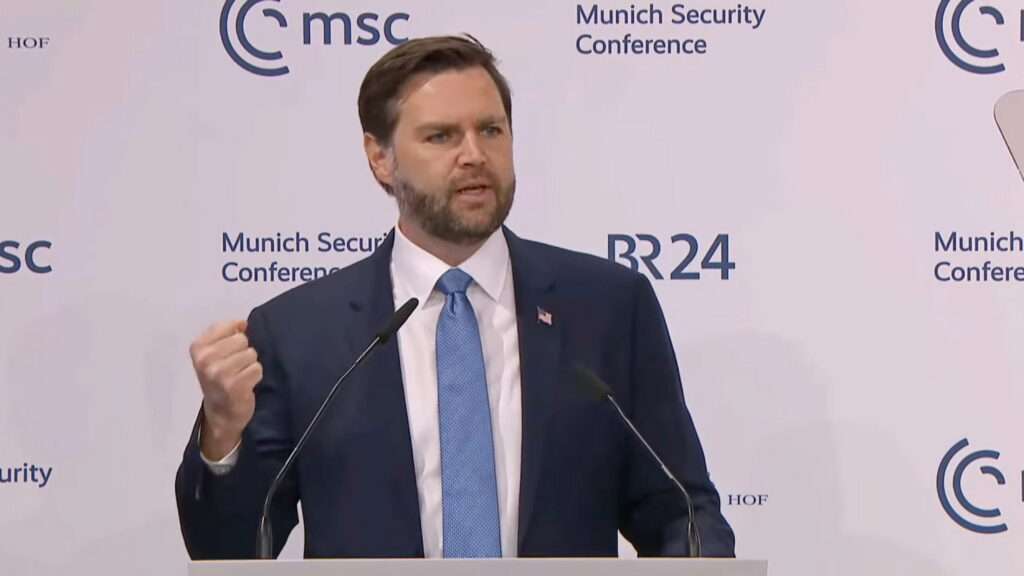Brussels – The Munich Security Conference is with bated breath. Defending Ukraine’s Euro-Atlantic ambitions seems to be left only with Brussels, at least nominally, as U.S. Vice President James David Vance downplays threats posed by Russia to the Old Continent. Before his talks with the White House’s number two, Volodymyr Zelensky met with the heads of EU institutions.
In September 1938, Munich was the setting for one of the most dastardly agreements in European history, when the democratic chancelleries allowed Adolf Hitler to tear apart then-Czechoslovakia by handing him the Sudetenland region (the object of the National Socialist Party’s Pan-Germanist aims) in the hope of averting a war. The result achieved by the strategy of appeasement was the invasion of Poland by the troops of the Reich within a year and, from there, the deflagration of the most devastating conflict recorded in human history.
From today (Feb. 14) until the day after tomorrow, world leaders are gathered in Munich to participate in the Security Conference (MSC). As the spectre of Russian President Vladimir Putin hovers over the Bayerischer Hof, the concern is that the new U.S. administration’s approach to negotiations with the Kremlin will repeat the same mistakes of the past.
“A failed Ukraine would weaken Europe, but it would also weaken the United States,” warned EU Commission President Ursula von der Leyen from the stage, a warning not to let Putin dictate the terms of the ceasefire that, after the phone call the day before yesterday with Donald Trump, now seems within reach.
Dear @ZelenskyUa, Europe stands with you for a just and lasting peace, with strong security guarantees.
We will keep providing continued and stable support to Ukraine.
And speed up work on your EU accession.
Joint read-out with @eucopresident ↓
– Ursula von der Leyen (@vonderleyen) February 14, 2025
Volodymyr Zelensky also attended the conference. The Ukrainian president is well aware that the window of opportunity to prevent Trump from negotiating directly with Putin bypassing Kyiv completely is closing fast. “A peace agreement cannot be signed in Munich; we remember what was signed here; I will not repeat it,” he said, adding that he does not want to be “that person in history who helped Putin occupy my country.”
While he awaits his face-to-face meeting with White House number two, James David Vance (with whom he said he was willing to “discuss the agreement on our minerals,” an option ventilated by Trump himself to secure military support for Kyiv), the Ukrainian president met with EU top officials.
The joint statement circulated after talks with the head of the EU executive and the President of the European Council, António Costa, reads of the commitment to “provide constant and stable support for Ukraine until the achievement of a just, comprehensive, and lasting peace,” the only outcome that “will lead to a sovereign and prosperous Ukraine and guarantee the security of Ukraine and Europe.” The note also reiterates “the willingness to put Ukraine in a position of strength before any future negotiations and to provide Ukraine with strong security guarantees.”
That is what European governments—especially the Baltic and Scandinavian ones—and High Representative Kaja Kallas have been repeating with particular insistence in recent days, after Washington’s Defense Secretary Pete Hegseth closed the door on any possibility of deploying U.S. troops in any peacekeeping operation in the former Soviet republic (an operation that, if there is to be one, must be outside the NATO umbrella). Costa, von der Leyen and Zelensky finally reiterated their shared will to “intensify work to accelerate Ukraine’s accession process” to the twelve-star club.
At the same time as Russian drones strike again the Chernobyl nuclear power plant, the Ukrainian leader warned that the Kremlin may soon launch an aggression from Belarus against a state along the Eastern flank of NATO, “perhaps Poland, perhaps the Baltics,” or launch a new offensive toward Kyiv.

But the eyes and ears of onlookers are all for Vance, who declared himself confident that “we can reach a reasonable agreement between Russia and Ukraine.” The vice president then threw a curveball by claiming that the greatest danger in Europe comes not from external threats but from the inside, from what he branded as “restrictions on free expression,” which are inherently undemocratic.
Exhorting European leaders to “not run away from voters,” Vance also suggested abandoning the “cordons sanitaire” against the far right just nine days before the federal elections in Germany in which the post-Nazi, pro-Russian far-right Alternative für Deutschland (AfD), consistently praised by Elon Musk, is credited by the polls with at least 20 per cent support.
English version by the Translation Service of Withub
![La presidente della Commissione europea, Ursula von der Leyen, alla conferenza internazionale sulla sicurezza [Monaco, 15 febbraio 2025]](https://www.eunews.it/wp-content/uploads/2025/02/vdl-monaco-350x250.jpeg)






![La presidente della Commissione europea, Ursula von der Leyen, alla conferenza internazionale sulla sicurezza [Monaco, 15 febbraio 2025]](https://www.eunews.it/wp-content/uploads/2025/02/vdl-monaco-120x86.jpeg)
